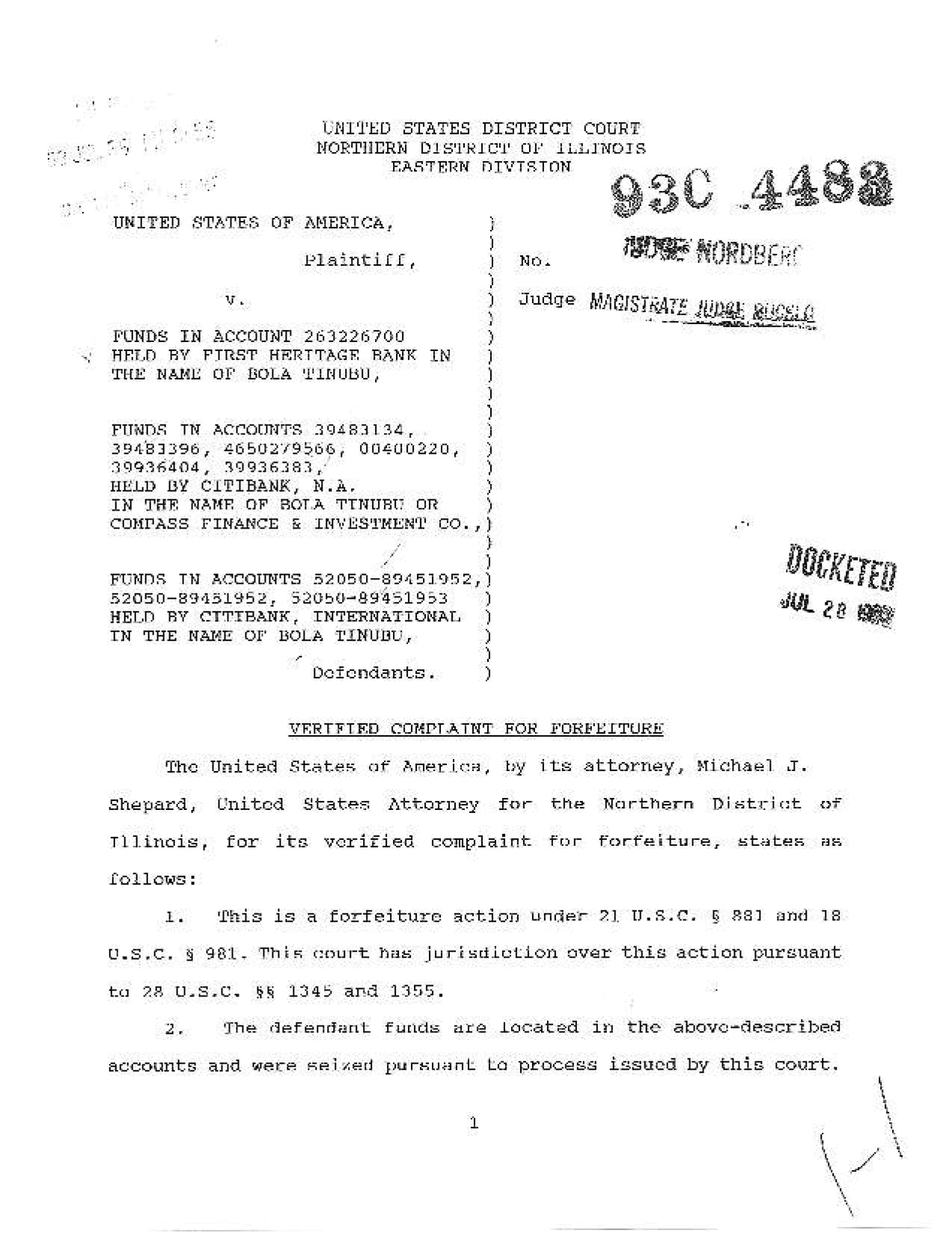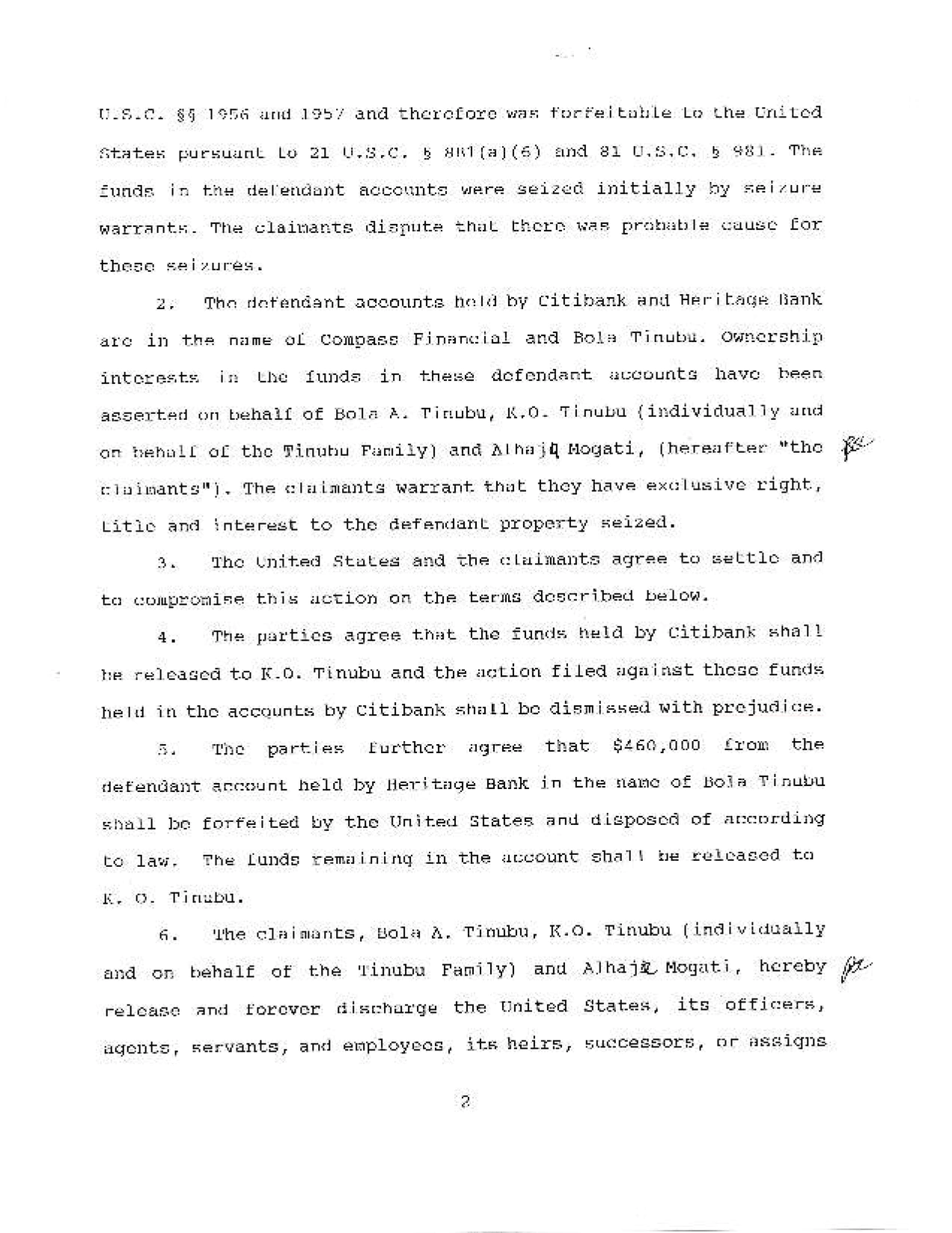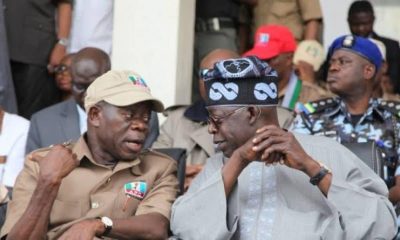Nigeria News
Bola Tinubu: ‘From Drug Lord To Presidential Candidate’

The Presidential candidate of the All Progressives Congress in the 2023 race, Bola Tinubu has been attracting numerous controversies about his past.
Over the years questions have been raised on the issue of his age, certificate, identity and how he made his wealth.
There are beliefs that the man Tinubu started when he moved to Lagos State to live with his surrogate mother, Alhaja Abibatu Mogaji.
Some of these questions have been left unanswered as he plans to take over from President Muhammadu Buhari at the end of his tenure in 2023.
A recent report by West Africa Weekly has linked the former Governor of Lagos State to a drug business in Chicago ahead of his presidential aspiration.
The history of Tinubu became easy to track following his journey to Chicago in 1975, after claiming to be in exile.
The former Governor upon his arrival in Chicago first spent 2 years gaining an Associate degree at Richard J. Daley College.
He thereafter proceeded to Chicago State University where he studied Accounting, completing his Bachelor’s degree in 1979.
Tinubu, in an interview with The News, claimed that he got a job with Deloitte & Touche, where he supposedly received an $850,000 bonus as a result of his work on a single onsite engagement at the Saudi state-owned oil firm.
West Africa Weekly, however, disclosed that a document, which was obtained from the US District Court of the Northern District of Illinois Eastern Division, allegedly revealed damning information about Tinubu.
The document contains a comprehensive federal indictment and associated case files from July 1993 containing clear and incontrovertible evidence that Tinubu was allegedly involved in laundering proceeds of heroin trafficking for a Nigerian drug ring in Chicago.
See the document below:


Further claims had it that Tinubu might have struck bargain with government agencies, which saved him from being convicted.
Among the dozens of documents in the case file, there is a sworn statement by IRS Special Agent Kevin Moss who personally investigated Bola Tinubu’s financial activities in the lead-up to Lee Edwards’s arrest.
See the document below:





In the interest of brevity, here is a Cliff Notes version:
The US Attorney for the Northern District of Illinois, Michael Shepard files the complaint for forfeiture of funds in bank accounts held by Tinubu as they hold the proceeds of a heroin distribution organization headed by Adegboyega Mueez Akande. Tinubu’s funds represent the “proceeds of this operation or property involved in money laundering” and the “proceeds of narcotics trafficking.” Shepard requests that the Court adjudge and decree that the funds should be forfeited to the United States.
Special Agent Moss has analysed financial documents including bank statements, money orders, cashier’s checks, tax returns, and “wire transfers of huge amounts of cash generated by individuals who are believed to be members of this heroin distribution organization,” and he reaches a professional conclusion that the accounts controlled by Tinubu “were involved in financial transactions representing proceeds of drug trafficking.”
The investigation, which began in 1988 has identified Adegboyega Mueez Akande, and his nephew, Abiodun Agbele as key figures in the trade and distribution of heroin. The investigation identifies the third individual working with the duo to launder their money as a certain Bola Tinubu.
In December 1989, Akande takes Tinubu to a First Heritage Bank to open an individual money account. On the application, Tinubu gives his address as 7504 South Stewart Avenue, Chicago, which is the same address Akande uses as his heroin trap house. Special Agent Moss discovers that Mrs. Oluremi Tinubu has previously opened a joint account at the same bank with Audrey Akande, wife of Adegboyega Mueez Akande.
On January 4, 1990, just 5 days after opening the account, Tinubu deposits $80,000 into it. On a subsequent credit application dated January 6, 1990, Tinubu states that he is an employee of Mobil Oil Nigeria Limited, with a total monthly salary of $2,400 and no other sources of income. He gives his address as 7504 South Stewart, and lists Akande as his cousin.
Despite earning $2,400 a month with no other known source of income, bank records from First Heritage Bank show that over the course of 1990 alone, Bola Tinubu deposits $661,000 into his individual money market account, followed by a further $1,216,500 in 1991.
When Special Agent Moss interviews Mobil Oil reps about Tinubu’s employment, they confirm that Tinubu works at Mobil Oil Nigeria as a treasurer, in a capacity that does not involve transfer or custody of large amounts of money. Moss also discovers that Tinubu has failed to file US income tax returns since 1984.
On January 10, 1992, a court order is obtained to freeze some of Tinubu’s bank accounts containing the suspected proceeds of heroin trafficking in excess of $1,400,000.
On January 13, 1992, during a telephone conversation from Nigeria with Special Agent Moss, Tinubu admits to the Agent that he knows Akande and that he had previously wire transferred $100,000 to Akande’s account in Houston. Further, Tinubu says that the $80,000 he deposited into the First Heritage Bank came from Akande. Tinubu also reveals that he had additional bank accounts in Fairfax, Virginia and London, UK.
Speaking over the telephone with Special Agent Moss on January 14, 1992, Tinubu admits that he knows Agbele and that he met him through Akande. Tinubu admits he has associated with Agbele and Akande in the US and Nigeria. In this conversation, Tinubu denies having any additional bank accounts in the US.
On January 24, 1992, following a seizure warrant to freeze over $500,000 of unexplained funds in Tinubu’s Citibank account, Citibank discovers 2 additional bank accounts controlled by Tinubu under the name of “Compass Finance and Investment Company Ltd.” Citibank’s account-opening KYC records bring up a Memorandum of Association and Articles of Organization identifying Akande and Agbele as directors of Compass Finance and Investment Company Ltd.
Between January 30 and 31, 1992, Tinubu does an about-face and tells US agents that he has never had any business association or financial relationship with Agbele or Akande. This statement directly contradicts his earlier statements and the documentation from Citibank and First Heritage Bank.
Special Agent Moss concludes in his submission, that based upon this evidence, there is probable cause to believe that a number of Tinubu’s accounts are involved in narcotics transactions. The Court concurs and orders the forfeiture on August 18, 1993.
Tinubu opts to fight the case, claiming that the money is legitimate and it belongs to his wife Oluremi Tinubu, and his surrogate mother Alhaja Habibat Mogaji. Ultimately, he enters into a settlement with the US government on September 15, 1993, agreeing to forfeit $460,000 of the heroin trafficking proceeds to the US government. The balance of roughly $1 million is released to him.












